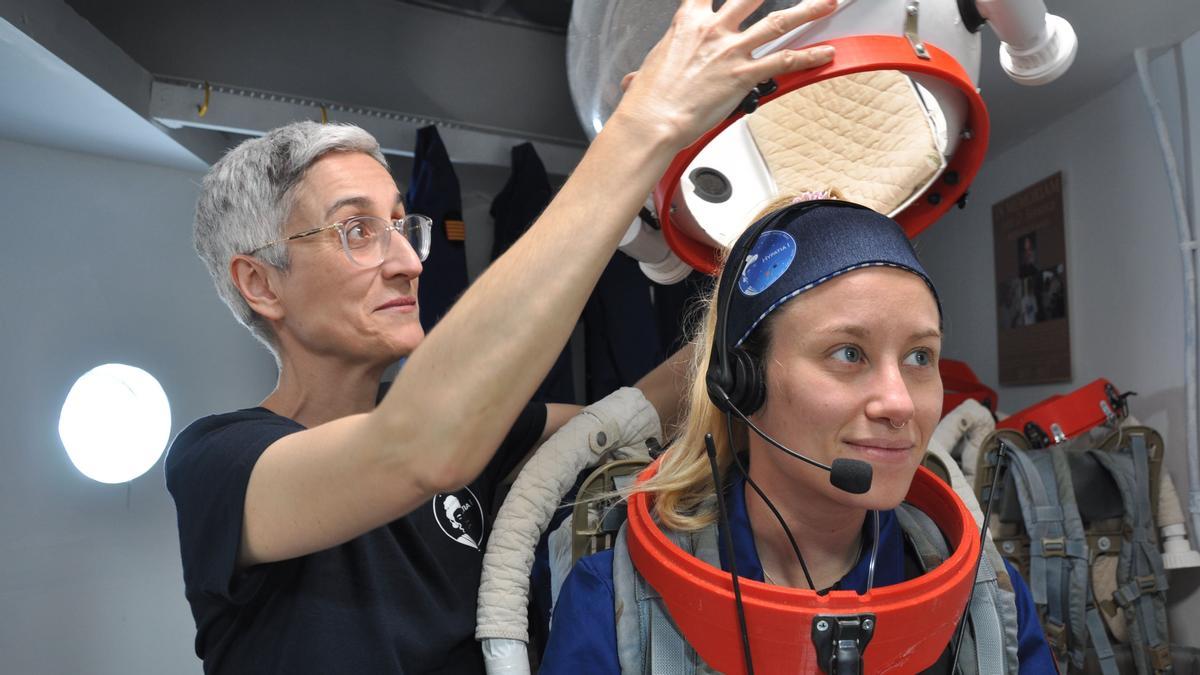A team of astrophysicists, biologists, engineers, mathematicians and journalists have just embarked on an unusual ‘extraterrestrial’ adventure. For two weeks, these scientists have lived in a martian simulator located in the desert of Utah (United States) to study how, one day, the future inhabitants of the red planet will live. Now, back in Barcelona, the members of the first Hypatia mission enthusiastically explain the success of their project and the lessons learned on their trip to ‘Mars’.
EL PERIÓDICO has compiled a small ‘diary’ with the «Martian teachings» of each of the members of this project.
Carla Conejo González, general director and biologist of Hipatia I
«The start of the mission was a difficult time for all. In my head there were many things that could go wrong. Especially in the extravehicular departures, in which I was afraid of not planning the route well and getting disoriented in the middle of the desert until we lost communications with the base. But As soon as I stepped on the Martian soil, against all odds, I felt very calm. We had prepared everything so thoroughly that we felt that nothing could go wrong. And that, even if she did, together we were going to find a solution.
I am convinced that what we have experienced on ‘Mars’ has also it has changed our vital and professional narrative. It has been an exciting journey of learning, camaraderie, effort, and lots of shared laughter. On Mars we were isolated, but we never felt alone«.
Mariona Badenas Agusti, commander and astrophysicist
One of the things that has surprised me the most about Hypatia has been the great complicity of all the members of the group, both on a personal and professional level. Despite not all of us meeting in person in one place before our journey to ‘Mars’, the team has worked perfectly in every way. The positive attitude of each of the membersASI como the respect and support of each with others, have been key factors in making Hypatia a complete success.
To all the boys and girls who dream of reaching Mars one day, my advice is to always be prepared for take any opportunity to explore what you like. Never stop fighting to achieve your dreams and always surround yourself with a good team, people who support you, who trust you and who accompany you on your way. Recalling an African proverb, «if you want to go fast, go alone; If you want to go far, I accompany you«.
Ariadna Farrés Basiana, head of health and safety
One of the things that has surprised me most about this experience is realize how little we need to live. When you live in such an environment, with limited resources, you realize what a privilege it is to live in big cities and with a house full of things. but actually With half of what we have, we would be able to be the same or happier than we are now.. A message for future travelers from Mars? I would tell them to enjoy the path they choose and just keep going.
Cesca Cufi Prat, engineer
I remember with special fondness the end of the simulation, the shared illusion of going outside again, feeling the freedom of walking without wearing a helmet, feeling the wind and sunlight on the skin. All this with the Satisfaction of having fulfilled a very important part of our project.
To the girls and boys who dream of traveling to Mars, they would tell them that they will never lose their curiosity and the illusion of learning, and that the most important thing is to be happy doing what one likes. The elderly have many stereotypes that unconsciously limit our possibilities. They have a freer mind and therefore a greater ability to create, to invent.
Núria Jar Benabarre, journalist on board
Thanks to my companions you never felt me. The success of this trip is due, above all, to the crew: both the strength of each one separately and the power of all together. The teaching that I keep? que The universe belongs to no one so we better take care of it together.
Laia Ribas Cabezas, greenhouse officer (Greenhub)
I was very surprised by the number of hours needed for maintenance from a Martian station. I was also surprised how in a mission like this you always end up lacking the time to develop all the research projects you would like. The positive part was know, live and love the other companions of the mission. Looking to the future, I believe that many professional disciplines are needed to set foot on the red planet. For this reason, for me, the most important lesson is to always work with what you enjoy because, with a lot of patience and will, you can reach your goal.
Neus Sabaté, mission engineer
I was surprised how motivating it is to be part of a crew 24 hours a day and feel that the task carried out under a certain role contribute to the collective success of the mission. The beauty of the mission was that a great harmony was established between us from the first moment and this made the day to day full of complicity and good feelings. A message for future generations? Forward, nothing more exciting than chasing a dream.

